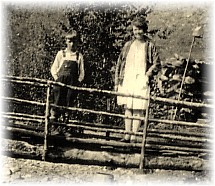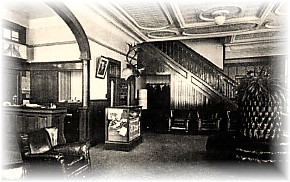My mother and I arrived in town
on a warm April day in 1931. Fairbanks was
barely thirty years old, a frontier settlement yet. Mom
had taught school in Franklin in the remote Forty Mile country the previous winter. Due to pregnancy, she closed school early, and
journeyed to Chicken, ten miles west of Franklin with wail carrier Willard Hansen. Willard was the man in her life, and soon-to-be
husband. Air travel, still an infant industry
in Alaska, was considered the quickest and safest way to transport Mom to Fairbanks. At age forty-two, she needed proper medical
supervision.

Bob Redding and his mother at Franklin,
1931
Franklin,
however, was perched on the sharply curved banks of the Forty Mile River, and offered no
suitable landing place. Chicken was better,
the river stretching out straight for less risky landing and takeoff. We were carried the ten miles in a horse-drawn
double ender sled.
While in Chicken,
a village so small there were few accommodations for travelers, we boarded with the Frank
purdys. They were as nice a family as anybody
could want to meet. Mrs. Purdy, Susie, was a
Native lady, who catered to us, as if we were queen and prince. Frank, a white man, mined for a living. He was a jovial host, and we felt at ease in their
home. Their children, Fred, Art, Isabelle,
and Martha, were nearly grown, and reflected the consideration of their parents. The fact that my mother was pregnant out of
wedlock, in an era that gasped at such carryings on, didn’t faze the Purdys. I’ve never forgotten that: Kindness finds its
own hearts, and ignores the rules.
Pilot Ed Young
arrived in a fabric-covered single engine Fairchild.
The plane was only large enough for my mother, me, the pilot, and our
baggage. We sat directly behind Ed. I was fascinated by the way he eyed the landscape
passing below, a cyclorama of what pulp writers once called “raw wilderness.” This was hilly country, deeply forested with
spruce, birch, and cottonwoods. Ed steered
his craft by landmarks, and, of course, experienced compass work. But the sky was clear, and I think he could have
found his way to Fairbanks without instruments. He
knew the layout of the land so well.
As I watched, the
panorama slowly drift beneath the Fairchild, my imagination went into high gear, and I
wondered what crashing would be like. Snow
was still deep, the April weather still unforgiving at night. I hoped Ed had emergency equipment aboard, but my
main strength lay in my mother. In a
wandering life—Franklin had been my sixth of seventh school since kindergarten days—Mom
had been my mentor, disciplinarian (her hair brush was no stranger to my fanny), and
guardian. I need not fear. If we crashed, my parent would find a way out.
When we reached
the still-frozen Tanana River, Ed pointed the nose of his plane west, and followed the
winding, white line into Fairbanks. Weeks
Field was soggy with spring melt, but our pilot brought the little craft to a safe, if
splashy, halt in front of an open hangar. We
climbed out stiff from the two-hour flight in cramped quarters, and stretched. Ed handed us our bags, and bid us farewell. He was killed a few years later, searching for
lost fliers in the Arctic.
At the field to
meet us was Fred Heinzleman, with his big, square Buick taxi. How he knew we were coming was no mystery. Keeping tabs on who was coming and going at the
airport was not difficult, and Fred kept tabs.
We found
seats in the comfortable interior of the Buick, and Fred drove us to the Alaska Hotel on
the corner of First and Wickersham. We
learned on the drive over what winter’s breakup meant to Fairbanks. There were no slow removal provided by the city. The snow was simply packed down all winter, and
now water formed large, deep pools. The
sidewalks were wooden, and floated in these miniature lakes. Children rafted on them, using long poles for
propulsion. Ah, so! I couldn’t wait.

The Alaska Hotel in Fairbanks in 1931
We dropped anchor
in front of the hotel, and Tom Foster, owner, met us at the check-in counter. He was a courteous man, who personally escorted us
to our second floor room. As we climbed the stairway, several guests, seated in black,
leather chairs near the windows nodded at us. The
two newcomers were a curiosity, and subject to speculation.
What my mother
thought I don’t know, but considering her condition, I can imagine.
We were both
tired, after the tension of the air trip, so we rested a bit. Then we decided to explore. We left the hotel, and gingerly made our way
south on damp Wickersham Street. Turning left
at Fourth Avenue, we crossed Barnette, and, without realizing it, entered the red light
district. It was located next to the downtown
business center, between Barnette and Cushman Streets.
Handy, so went the snicker.
Citizens, who
knew better, avoided walking Fourth in that section, but we were newcomers. What did we know?
Mom remarked about the strange stares we received on emerging.
Fairbanks was the
Big Town to us. After the quiet of Franklin,
ringed by miles and miles of steep hills, we were thrilled by automobiles, and temptations
of the many shops. We took it all in, walking
slowly north toward the Cushman Street bridge, which spanned the muddy Chena Slough. The slough (it wasn’t yet called a “river”
by the general populace) divided Fairbanks, north and south. At one time this meandering little waterway was an
important inland port.
We arrived at the
Horseshoe Cigar Store, between First and Second Avenues.
There, behind a large display window, were several hundred tins of Trojan
condoms. The tins were orange and white in
color, with a Greek warrior’s helmeted head printed thereon in dramatic black. I was impressed, and inquired of my parent about
them. After one startled glance, she grasped
my hand, and said, “Never mind,” and led me off quickly. Today, condoms are displayed in drugstores along
with bunion pads, but back in the who-ha thirties? The
display, was puckish, and meant to shock, but was thoroughly in touch with the rough humor
of that place in that time.
We continued our
investigation, and wandered to the Fairbanks Cigar Store on Second Avenue. A sigh in the window informed me that we could
purchase a milk shake for fifty cents. Having
been without such goodies for a long time—there were no such treats such as this in
Franklin, a settlement consisting of little more than a log roadhouse, school building,
and the barn—Mom decided to go for it.
We entered what
had been a tavern before Prohibition. There
was a long bar, and behind it a counter man. My
parent ordered two shakes, please, very polite she was.
The shakes were mixed in a single, metal container. Glasses were set on the counter, and both filled
from the one container.
“That will
be one dollar,” said the man.
“Where is
the second shake?” my mother asked.
“You have
two,” was the reply.
She paid, and we
drank, but my parent never returned. She
might be cheated once, never twice.
Being still
hungry after the skimpy servings, we crossed the street to the Model Café. Tom Youle, the proprietor, waited on us. The Model was a family restaurant, with the
slogan, “If your wife can’t cook, keep her for a pet, and eat here.” We ordered hamburger steaks, which arrived
sizzling hot, with baked potatoes, and cold bean salad.
Large slices of dried apple pie blessed us as desert, and I though I’d
died and gone to heaven. After the fiasco at
the Fairbanks Cigar Store, the Model was a joy. We
were to dine there many times in the coming years.
After the meal,
we returned to the hotel, we took the First Street route, following the Chena Slough. Along the way, Mom bought a Fairbanks Daily
News-Miner. We would need permanent
quarters, and hopefully the classified advertisements would point the way.
Our first
day in Fairbanks was about over. We had made
the transition from a simple country style of life, to the hazards and tricks of
civilization without serious shock or loss.
© Bob Redding

